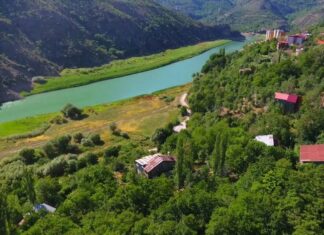Istanbul lived it`s “Golden Age” between 527 and 565.
It was the most magnificent and the greatest city of its era with a population more than half a million.
A capital that hosted East Roman-Byzantine Empire for 1,600 years and then Ottoman Empire. A hundred and twenty Kaisers and emperors had passed from this city. Its origin goes far back to dark labyrinths of the mythology.
“Land of the Blind!” This is how Delphi Byzas, the leader of Megarian, defined the other side of Bosporus; because he thought the residents of Chalcedon whose leader was also Greek, must have been blind to skip the beauty of European shores and for settling down there. Thus, Megarons founded their new settlement right here, just the opposite side of Chalcedon, called Kadikoy today, in 667 AD on the ridges the Topkapi Palace is located today. Then they named it “Byzantium” attributed to their leader.
Becoming an active business center after a short while, the city was taken by Persians room after its foundation. After avoiding the Persian danger; Byzantium, ruling the trade in the Black Sea, thus had vital importance for the Greek, was tried to be taken by Sparta and Athens one after another. During the Greek civil war,
King Philip II of Macedonia
King Philip II of Macedonia the besieged the city for three years but he could not take it.
Byzantium did not give itself to Alexander the Great, either. In 196 AD, the city was conquered by Roman Emperor Septimus Severus. And in 330, Emperor Constantine gave his name to the city and declared as the new capital of Roman Empire.
The bronze and marble statues and the masterpieces of the most skillful artists were brought to the capital, hence the city developed and expanded five times more than before. Large squares and wide roads were built, however there isn`t much remaining from those days: The Hippodrome (At Meydam) that had been initiated by Septimus Severus in 230 AD and completed by his successors, the Column of Constantine (Cemberlitas) and the splendid Aqueduct of Valence (Bozdogan Kemeri).
The Theodosian city walls that were built during the first half of the 5 century and have a length over 6.5 km designated not only the borders but also the appearance of the city until the 20 century. Constantinople had become the capital of East Roman Empire and lived it`s “Golden Age” during the Justinian period (527-565). After the suppression of a rebellion that 30,000 people had died, Justinian made Constantinople the most magnificent and the greatest city of its era with a population more than half a million.
Read More about Shirts with Talisman








